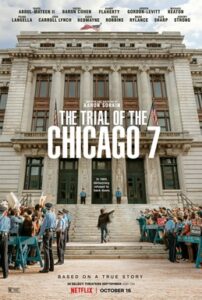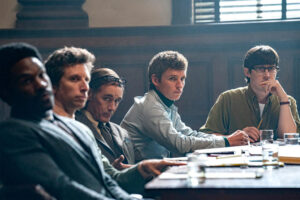One Liner Review:
A pretty powerful courtroom drama, this one is very well-made and entertaining, but the conflict seems to be more between the judge and the defendants then it is between the defense and the prosecution.
Brief Review:
A pretty remarkable film, this one is definitely not what you would expect. It’s a trial movie that spends a good deal of time away from the trial, either showing the lawyers planning and hunting down clues or showing flashbacks to the events in question. And it makes the judge the biggest antagonist of the movie, something that we have rarely seen before. The movie is presented almost like a mystery with new clues. ideas, and revelations coming out as it goes on. And there’s loads of tension mixed with fantastic dialogue. There’s even great humor mixed into this one. It’s the kind of movie that takes more than one viewing to truly appreciate, and is far better on a second viewing than a first, but either way it’s an excellent film.
REVIEW:
The Trial of the Chicago 7 is a Netflix movie, and it most likely will be one of the front runners for best picture. If so, it is definitely well-deserved with its giant scope, ensemble cast, and prestige in filmmaking. The movie is about a volatile time in America which leads to a protest that turns violent. Seven protestors are arrested for inciting the violence and the court room drama that chronicles their trial is what follows. It’s a compelling story, filled with rich dialogue and vivid characters. And it does something that we haven’t really seen done in a trial movie before… it makes the judge the antagonist. Not the prosecution and its lead lawyer, played by Joseph Gordon Levitt, but the judge. Talk about getting creative.
The movie takes place in the sixties, with protests over the Vietnam war. It’s a movie that was directed by Aaron Sorkin, a guy who is clearly a masterful talent behind the camera. Sorkin wrote the play and then screenplay for A Few Good Men (one of the best courtroom dramas of all time.) He also wrote The Social Network and Steve Jobs. None of these were easy projects. And Sorkin showed how masterful of a writer he was with every one of them. But what about as a director? That’s new ground for Sorkin. He directed the movie Molly’s Game, which was just okay. But the Trial of the Chicago Seven is where he really shows his skill. Back in the courtroom, just like with A Few Good Men, this movie is another powerhouse ensemble piece.
The opening alone shows Sorkin’s skill behind the camera. You’ve got lots of different scenes of news footage announcing the draft, showing people getting their mail, featuring speeches and then assassinations of Martin Luther King Jr and Bobby Kennedy. And all of it leads into the introductions of our characters, lecturing. First we zoom out from a slide show of protestors to show Tom Hayden (Eddie Redmayne,) and Renny Davis, leaders of the student democratic organization. And their dialogue is cut and even continued by Abby Hoffman (Sacha Baron Cohen,) and Jerry Rubin who are speaking at a night time campus rally.
There’s even humor mixed in, because while the sentence of Tom in one scene is continued by Abby in another, the meaning, context, and tone of the sentence are completely changed. Tom is speaking about seriousness, and Abby is speaking about getting laid. The same thing happens when we move from Bobby Seale to Dellinger. Seale is talking about violence, and Delinger is continuing his sentence, only talking about non-violence. These two characters are in motion now, as opposed to Tom and Abby who started off the sequence. Seale is moving around a bustling office while talking. David Dellinger is packing his car, while talking to his family. And all of this announces that this movie has real momentum. Bobby Seale’s dialogue in particular, rattling off all the leaders who have been assassinated recently… MLK, Malcolm, JFK, Robert Kennedy. The direction of the sentence keeps changing, like it’s massive game of telephone, with loud, fast-moving music playing in the background. Talk about an opening.
From there, we see the hiring of Joseph Gordon Levitt’s character, a lawyer named Richard Schultz, (Joseph Gordon Levitt,), by the United States Attorney General John Mitchell (played by the great John Doman from The Wire and The Boys.) The snappy dialogue continues here. Mitchell owns the scene as he perfectly exudes anger and control, two things that don’t often go together. There’s a lot of back and forth, with Levitt’s character arguing against the secretary, and the secretary giving it right back to him. “I hired you for your thoughts? Who told you that? I hired you to win.” There are moments in this scene that feel like they are right out of Glengarry Glen Ross, and that’s a very good thing. Mitchell doesn’t just talk about the case he wants Schultz to try for tre government, but also about the way the former attorney general left the office, in a manner that clearly still bothers Mitchell to the point where he keeps bringing it up. Again, great humor mixed in to the snappy and often ferocious dialogue.
And now it’s the trial. We start out with the lawyers walking in, being interviewed by reporters outside the courtroom. Then we move to Abby and Jerry walking in, and Jerry catching an egg that was thrown at him, and then not knowing what to do with it. This humor is so simple and yet so weird that it’s just perfect. Like there are multiple lines about the egg. And then we are inside the courtroom, watching characters prepare. The camera moves around the room shoring is the whole scene including Renny Davis sitting on a table, writing a list of names, Tom Hayden pacing back and forth making his way over to Davis to ask him about the list, and then William Kuntsler, the defense lawyer (played by Mark Rylance,) telling Hayden to keep the resentment between he and Abby out of the newspapers.
And then a trial starts. The prosecutions opening statement. It gets interrupted almost immediately by the judge, who wants to clarify to the court that he is not related to Abby Hoffman, despite having the same last name. Then there’s Bobby Seale, the Black Panther leader, interrupting the opening statement to object since he doesn’t have a lawyer. And then there’s the judge again, interrupting because all of the defendants names have not been stated for the record. This leads to some hilarity about how Judge Hoffman can’t get some of the names right. And it goes on for quite a while, leading to a very comical scene.
After the opening statement, we go to a back room to watch a meeting of the defendants with their lawyers. There is so much talent on display here from Eddie Redmayne to Sacha Baron Cohen to Mark Rylance, every scene that this batch gets together in the same room turns out to be great. We get a real sense of the animosity between Abby and Tom, and the tension that will continue on throughout the course of the film. And this is just the beginning of the trial. From there, we start seeing witnesses called to the stand line the man who refused to grant permits to the protestors. Pretty soon we’ve got undercover agents coming to the stand, like a woman who posed as a romantic interest to Jerry Rubin. There’s even a surprise revelation and witnesss who gets called to the stand late in the game and has a lot to offer. That brief segment alone features some home run dialogue… “and the real William Kuntsler just showed up.”… “Now is the time to find some courage.” …. “Found some.”
The movie is filled with courtroom drama, and behind the scenes trial planning, but it also makes sure to show us the big moments of protest and violence. Two of them, shown at two different parts of the movie. One is during the day, after Tom Hayden has been locked up. The other takes place at night, when Hayden Spurs the crowd on with an announcement made out of anger, and caught on tape, “if blood is gonna flow, let it flow all over the streets.” Both of these sequences are presented to us in fantastic cut away scenes that combine different situations and dialogue from different places, almost like montages. With the daytime March to the prison, and then back to the park, we are told the story in three ways… witnesses on the stand (undercover cops who posed as protestors,) mixed with Abby telling the story on stage to a crowd at night (he’s basically our narrator for these parts,) mixed with actually seeing the events and the March as it was happening. All of this is brilliantly pieced together so that we get lines of dialogue, like “someone in the crowd yelled..” And it’s all set to lively, fast-moving, tension-building music.
The same technique is used for that final night time riot. Only this time instead of seeing the story presented in court with witnesses on the stand, we see it told in the office of the defense lawyers as their clients gather around a tape recorder and the whole truth comes out. This time it’s Abby on stage telling the story to a crowd cut with the lawyers and defendants in the office recounting the story while standing over the tape recorder – with a tape they can play at any minute containing the actual aloe holes made that night – combined with seeing the actual events happen, as they unfolded and the riot took place. Abbys narration really goes to town here, bringing us all the way through the streets and up to the window of a bar and a showdown between cops and protestors. All of this shows off the precision and craftsmanship used to tell this story. The movie is a live-wire masterpiece. In other hands the same story could of felt dull and simple, but here, told in this way, it is electric. Everything from the Bobby Seale man without a lawyer and horrid courtroom treatment material to the animosity between Abby and Hayden, and how the reasons for it end up coming out… everything works. Everything has layers. This is one pretty remarkable film.

